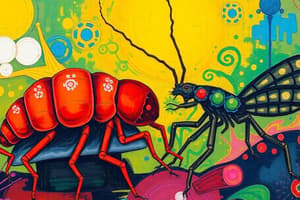Podcast
Questions and Answers
What defines the interaction in parasitism, and how does it affect the host?
What defines the interaction in parasitism, and how does it affect the host?
In parasitism, one species benefits at the expense of the host, which suffers negative effects such as impaired functions or increased vulnerability.
Differentiate between ectoparasites and endoparasites with examples.
Differentiate between ectoparasites and endoparasites with examples.
Ectoparasites, like ticks, live on the outside of the host, whereas endoparasites, such as roundworms, live inside the host.
Explain how mistletoe acts as a parasite and its method of obtaining nutrients.
Explain how mistletoe acts as a parasite and its method of obtaining nutrients.
Mistletoe forms connections with host plants, extracting water and mineral nutrients through these connections.
Discuss the life cycle of the Ascaris roundworm and its method of transmission to humans.
Discuss the life cycle of the Ascaris roundworm and its method of transmission to humans.
What are some potential effects of parasitic infections on the host's health?
What are some potential effects of parasitic infections on the host's health?
Why are tropical and subtropical regions at a higher risk for roundworm infections?
Why are tropical and subtropical regions at a higher risk for roundworm infections?
How do parasites outnumber free-living species, and what implications does this have?
How do parasites outnumber free-living species, and what implications does this have?
What is the significance of the relationship between parasites and their hosts in ecological terms?
What is the significance of the relationship between parasites and their hosts in ecological terms?
Describe the life cycle of roundworms as detailed in the content.
Describe the life cycle of roundworms as detailed in the content.
What differentiates ectoparasites from endoparasites?
What differentiates ectoparasites from endoparasites?
Explain the feeding behavior of leeches and its impact on their hosts.
Explain the feeding behavior of leeches and its impact on their hosts.
What is the role of Plasmodium falciparum in disease transmission?
What is the role of Plasmodium falciparum in disease transmission?
How do fleas negatively impact their canine hosts?
How do fleas negatively impact their canine hosts?
What is the significance of commensalism in ecological relationships?
What is the significance of commensalism in ecological relationships?
Identify the three types of lice that affect humans and their common treatment.
Identify the three types of lice that affect humans and their common treatment.
Flashcards
Parasitism
Parasitism
A relationship where one organism (the parasite) benefits by harming another organism (the host).
Parasite
Parasite
An organism that benefits from another organism (the host) at the host organism's expense.
Host
Host
An organism that is harmed or affected negatively by a parasite.
Ectoparasite
Ectoparasite
Signup and view all the flashcards
Endoparasite
Endoparasite
Signup and view all the flashcards
Ascaris lumbricoides
Ascaris lumbricoides
Signup and view all the flashcards
Fecal-oral route
Fecal-oral route
Signup and view all the flashcards
Roundworm Infection
Roundworm Infection
Signup and view all the flashcards
Endoparasite
Endoparasite
Signup and view all the flashcards
Ectoparasite
Ectoparasite
Signup and view all the flashcards
Parasite
Parasite
Signup and view all the flashcards
Host
Host
Signup and view all the flashcards
Roundworm
Roundworm
Signup and view all the flashcards
Tapeworm
Tapeworm
Signup and view all the flashcards
Tick (parasite)
Tick (parasite)
Signup and view all the flashcards
Fleas
Fleas
Signup and view all the flashcards
Parasitism
Parasitism
Signup and view all the flashcards
Commensalism
Commensalism
Signup and view all the flashcards
Lice
Lice
Signup and view all the flashcards
Study Notes
Parasitism
- Parasitism is a symbiotic relationship where one species (the parasite) benefits, and the other (the host) is harmed.
- The parasite typically lives on or in the host, obtaining food from it.
- Parasitism doesn't usually kill the host, but the host might suffer various negative effects.
- Examples of parasites include insects, worms, crustaceans, plants, fungi, and microbes.
- Parasites are estimated to outnumber free-living species by a ratio of roughly four to one.
- Ectoparasites live on the outside of the host (e.g., ticks, mistletoe).
- Endoparasites live inside the host (e.g., parasitic fungi, roundworms).
- Parasites can cause various harms to the host, including a shortened lifespan, impaired functions like digestion or photosynthesis, and increased vulnerability to predators.
- Ascaris lumbricoides (roundworm) is a common parasitic worm in humans, transmitted through the fecal-oral route.
- Roundworms and tapeworms are endoparasites found in the gut of mammals, feeding on the host's partially digested food, depriving the host of nutrients.
- North American bighorn sheep are often parasitized by lungworms.
- Tapeworm infections in humans can result from eating undercooked food containing tapeworm larvae.
- Other ectoparasites include fleas, leeches, and lice (body, head, and pubic).
- Ticks and leeches feed on the host animal's blood
- Some fungi are external parasites, such as those causing tinea and athlete's foot.
- Lampreys attach to their host, feeding on their blood and tissues
- Plasmodium Falciparum is a single-celled parasite that causes malaria, spread primarily by mosquitos.
Commensalism
- Commensalism is a symbiotic relationship where one species benefits, and the other is neither harmed nor helped.
- Examples include:
- Birds or possums nesting in tree hollows.
- Epiphytes (plants such as orchids, ferns, mosses, liverworts and lichens) growing on trees.
- Remora fish attaching to sharks and feeding on uneaten food scraps.
- Barnacles attaching to whales.
Studying That Suits You
Use AI to generate personalized quizzes and flashcards to suit your learning preferences.



